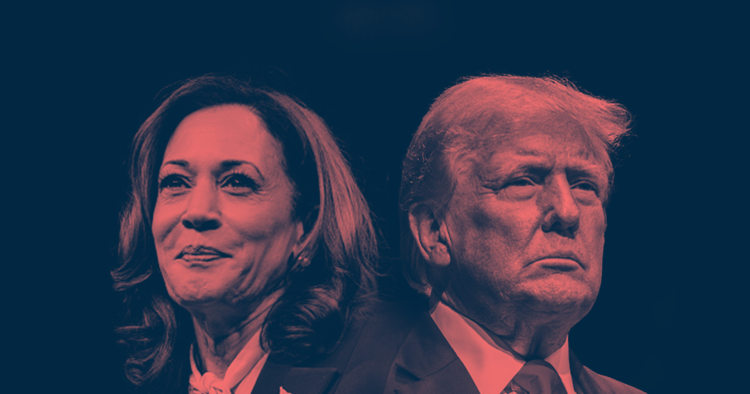Read full tracker with an expanded issue set
Introduction
The final weeks of America’s 2024 presidential campaign have been mostly focused on issues closer to home, with the two candidates emphasizing social and economic concerns rather than foreign policy. Television ads and candidate appearances in swing states, states pivotal for winning the essential 270 votes in America’s electoral college system, have centered on America’s democracy, immigration, abortion, and inflation.
It may seem surprising that the Middle East is not playing a bigger role in America’s main political choices this election given the historic magnitude of events unfolding in the region at this particular time. The Middle East has witnessed a series of surprises — and not just in October — over the past few months. These have included:
-
Israeli strikes that killed top leaders of Hamas, Hezbollah, and Iran’s Islamic Revolutionary Guard Corps;
-
Daily attacks and incursions against Israel in a multi-front war of attrition;
-
Murders of hostages held by Hamas in Gaza;
-
Stepped-up attacks by the Houthis in Yemen against international shipping in the Red Sea.
Israel’s new round of retaliatory strikes against Iran over this past weekend could lead to a series of additional “October surprises” — unexpected news events late in the campaign that could alter the state of the electoral race — in the coming days before Election Day, Nov. 5.
Yet the two main presidential candidates have not prioritized the Middle East as much as some in the region might have expected or different vocal advocacy groups in America might have hoped. The main reason for this is that until now, the price of oil and natural gas has remained fairly stable and there has been no major terrorist attack against the US homeland or troops stationed in the region.
The Middle East Institute has tracked the positions of both main candidates during the past three months. This policy assessment examines the statements and positions staked out by Vice President Kamala Harris, the Democratic candidate for president, and former President Donald Trump, the Republican candidate, as well as their respective running mates, Tim Walz and J. D. Vance. The spotlight is on the past few weeks, with a stronger focus on two main issues that are likely to dominate the regional agenda of the next US administration: Iran and Israeli-Palestinian affairs.
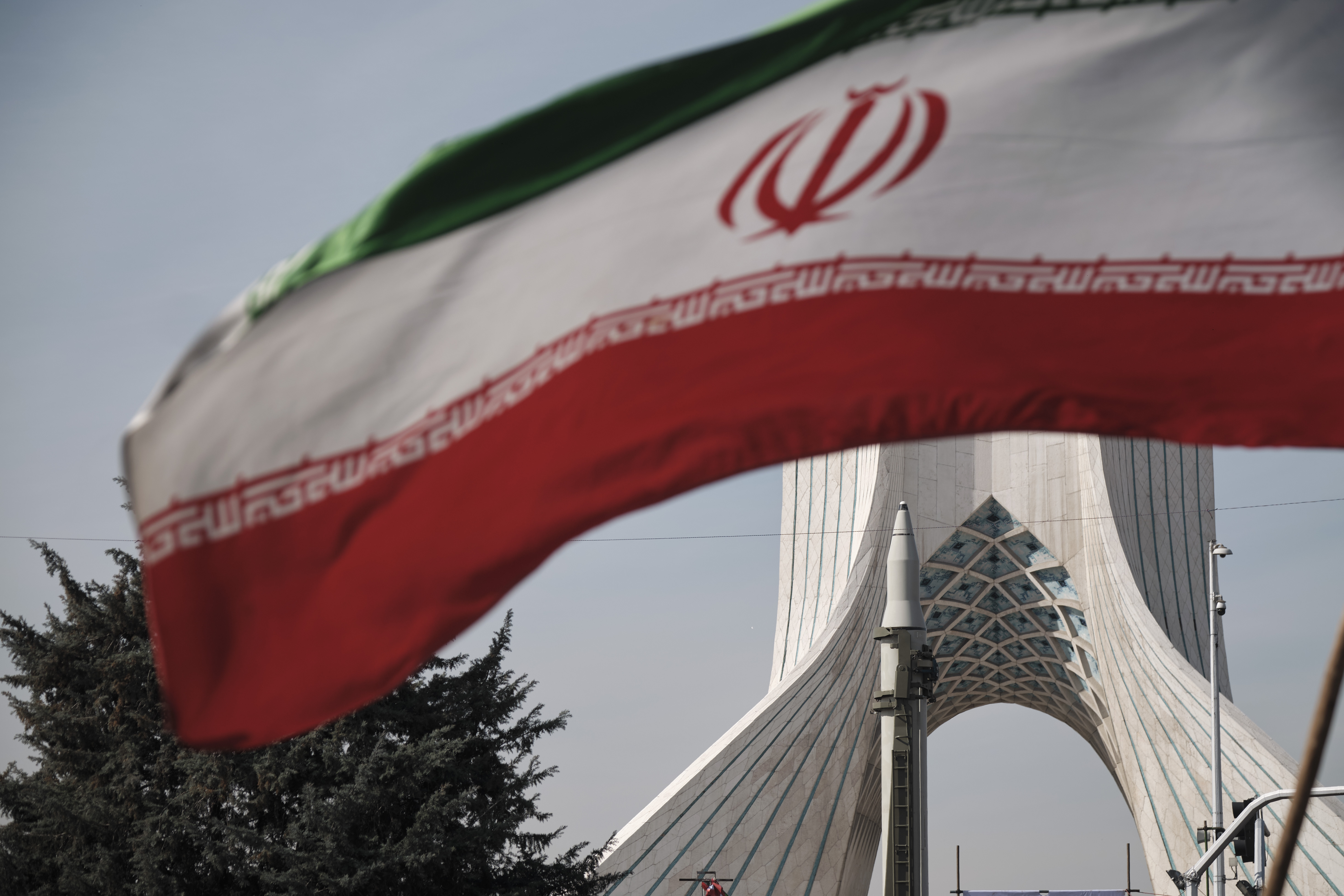
Iran
Both leading candidates agree that the United States should prevent Iran from getting a nuclear weapon, and both have criticized Iran’s destabilizing actions across the region. After Israel’s latest retaliatory strike against Iran on Oct. 26, both Harris and Trump expressed support for Israel’s right to defend itself against threats posed by Iran.
Harris-Walz: Five Key Positions and Statements
1. Naming Iran as America’s greatest adversary. When Harris was asked which foreign country she believes is the US’s “greatest adversary,” she stated “I think there is an obvious one in mind, which is Iran. Iran has American blood on their hands.”
2. Defending against Iran’s destabilizing actions. Harris joined President Joe Biden and the national security team in the White House Situation Room on Oct. 1 to monitor Iran’s attack on Israel, the same day that Biden ordered US Navy destroyers to join the Israel Defense Forces’ (IDF) efforts to intercept inbound missiles.
-
Harris condemned Iran’s missile attack on Israel and described it as “reckless and brazen” in a speech released by the White House. She also declared, “I am clear eyed: Iran is a destabilizing, dangerous force in the Middle East, and today’s attack on Israel only further demonstrates that fact.”
-
Harris stated that she “fully support[s]” the US military shooting down Iranian missiles targeting Israel, “just as we did in April.” She concluded by saying that Iran is a threat to American personnel, US interests, and innocent lives, and that the administration will work with its allies and partners to “disrupt Iran’s aggressive behavior and hold them accountable.”
3. Stopping Iran from getting nuclear weapons. Harris has reiterated the Biden administration’s position that Iran should not obtain a nuclear weapon and stated in early October that “all options are on the table,” as she said her preferred option was diplomacy.
-
Her running mate, Tim Walz, blamed the Trump administration’s “fickle” leadership for why Iran is closer to a nuclear weapon. In an interview with Bret Baier of Fox News, Harris also blamed the Trump administration for pulling out of the 2015 Iran nuclear deal, which “would’ve actually put Iran in check.”
-
During a CBS “60 Minutes” interview, on Oct. 7, Harris also asserted that ensuring “that Iran never achieves the ability to be a nuclear power” is one of her highest priorities. When asked if she would take military action if there was proof Iran was building a nuclear weapon, she demurred, saying she would not “talk about hypotheticals at this moment.”
4. Supporting the Israeli military strike that eliminated Hezbollah’s leader. Harris declared that Hezbollah leader Hassan Nasrallah, a close partner of Iran, was a “terrorist with American blood on his hands,” in a statement addressing his death on Sept. 28. She noted that for decades, Nasrallah’s leadership of Hezbollah “destabilized” the region, “killing countless innocent people in Lebanon, Israel, Syria, and around the world.” Harris underscored that with his death, the victims of Hezbollah have a “measure of justice.” She also asserted that diplomacy is the “best path forward” in order to create regional stability and protect civilians.
5. Backing efforts to help Lebanon. Harris highlighted the administration’s decision to send an additional $157 million in assistance for “essential needs” in Lebanon, while acknowledging that this totals $385 million in US aid to Lebanon over the past year. She expressed her “concern” for the “security and well-being of civilians suffering in Lebanon” and asserted that she will “continue working to help meet the needs of all civilians there.” Lebanon is a key theater in a regional competition for influence that has included Iran.
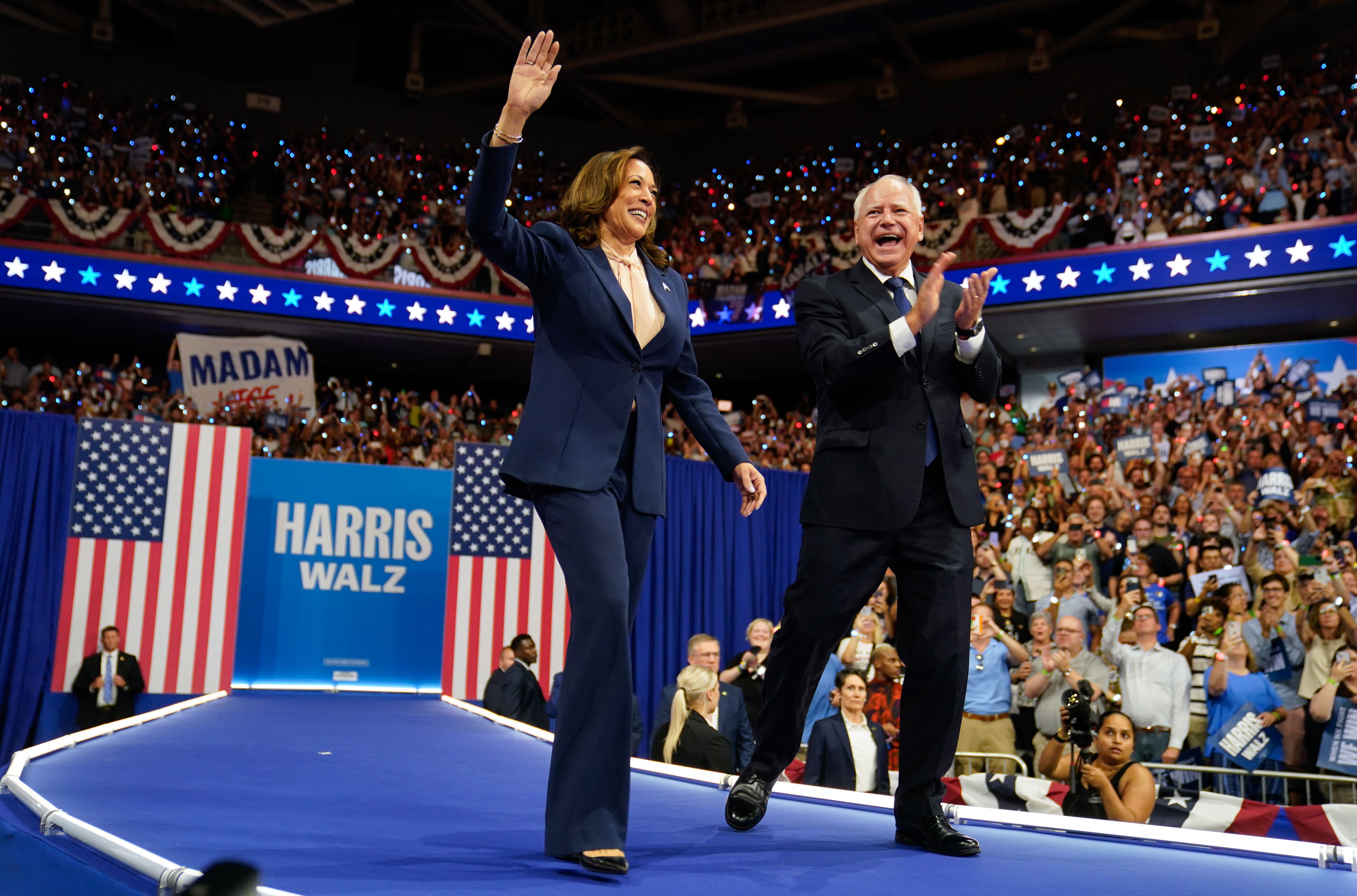
Trump-Vance: Five Key Positions and Statements
1. Arguing that Iran’s attacks against Israel would not have happened on his watch. A consistent narrative advanced by Trump is that the world is more chaotic today than when he was in office, and he cites Iran’s attacks on Israel as one of several examples.
-
In a statement released on his Truth Social account after the Iranian attack on Israel, Trump declared that “the World is on fire and spiraling out of control” and that under his administration, “Iran was in total check. They were starved for cash, fully contained, and desperate to make a deal.” In the same post, he argued that Iran wants Kamala Harris to be president because “as long as she is in power, they can take advantage of America.”
-
Trump asserted, “THIS WAR WAS TOTALLY PREVENTABLE. IT SHOULD HAVE NEVER HAPPENED. IF I WERE PRESIDENT, IT WOULD NOT HAVE HAPPENED!” on his Truth Social account.
2. Making the case that Iran had access to more money because of Biden-Harris policies. Both Trump and Vance have argued that Iran’s regime has more cash today than it did under Trump’s “maximum pressure” policy approach to Iran in 2018-2021.
-
In a “Fox & Friends” interview on Oct. 18, Trump repeated that during his presidency “nobody was buying oil from Iran, they wanted to make a deal. Now they have $300 billion in cash.”
-
Vance, when responding to whether he would support or oppose a preemptive strike by Israel on Iran, asserted that Donald Trump “delivered stability in the world … by establishing effective deterrence.” Furthermore, he declared that under the “Kamala Harris administration [sic],” Iran has received over $100 billion in unfrozen assets, which are being used to “buy weapons that they’re now launching against our allies … and potentially launching against the United States as well.” Vance reasserted Trump’s notion of “peace through strength” and how this prompted countries to turn to the US for stability and peace when others were “out of line.”
3. Stopping Iran from getting nuclear weapons. Like Harris, Trump has stated that Iran should never get a nuclear weapon.
-
During a press conference in New York City on Sept. 26, Trump said that Iran “would have made a deal with us” and that “the only thing is they cannot have nuclear weapons.”
-
On Oct. 4, Trump commented that Biden’s answer to whether he would support an Israeli attack on Iranian nuclear facilities should have been “hit the nuclear first, and worry about the rest later,” instead of being unsupportive of such a strike. He also underscored that nuclear weapons are the “biggest risk we have.”
4. Arguing that he could strike a deal with Iran and even bring it into the Abraham Accords. Trump has stated repeatedly that he could get a deal with Iran in a short period of time and might even bring Iran into the Abraham Accords with Israel, without providing details on how he would do so.
-
When asked if he would re-negotiate a deal with Iran if he was re-elected, Trump said “Sure, I would do that” and that “we have to make a deal because the consequences are impossible.” He also asserted that Iran would have made a deal because “[he] gave them a country that wanted to make a deal. They had to. There was no money to Hamas. There was no money to Hezbollah.”
-
On Sept. 19, while speaking to the Israeli-American Council, Trump commented that he “might’ve even had Iran signed” onto the Abraham Accords.
-
During Trump’s interview with Al Arabiya on Oct. 20, he said that he has “respect” for Iran and its people, underscoring that they are “very smart,” “great negotiators,” and “great business people.” He declared that “as a country, [he] wants it to do great” and that now the country is “probably in danger, maybe more so than they would’ve thought a month ago with what’s happening.”
5. Highlighting the threat Iran poses to America, including assassination attempts. US intelligence and law enforcement agencies alerted Trump about Iranian plots against his life, and Trump used this information to talk about possible consequences for Iran in US retaliation.
-
Trump discussed the last two assassination attempts on him, in Butler, PA, and West Palm Beach, FL, asserting that “they may or may not involve, but possibly do, Iran,” while acknowledging the lack of evidence to prove Iran’s involvement. He proceeded by declaring that if he were president, and a Republican or Democratic candidate were under threat, he would “inform the threatening country, in this case Iran, that if [they] do anything to harm this person, we are going to blow your largest cities and the country itself to smithereens.” Trump further stated that after this, “there would be no more threats” and that right now “we don’t have that leadership, or the necessary people, or necessary leaders” for that to happen.
-
On Sept. 25, Trump posted on X, “Big threats on my life by Iran. The entire US Military is watching and waiting. Moves were already made by Iran that didn’t work out, but they will try again. Not a good situation for anyone….An attack on a former President is a Death Wish for the attacker!”
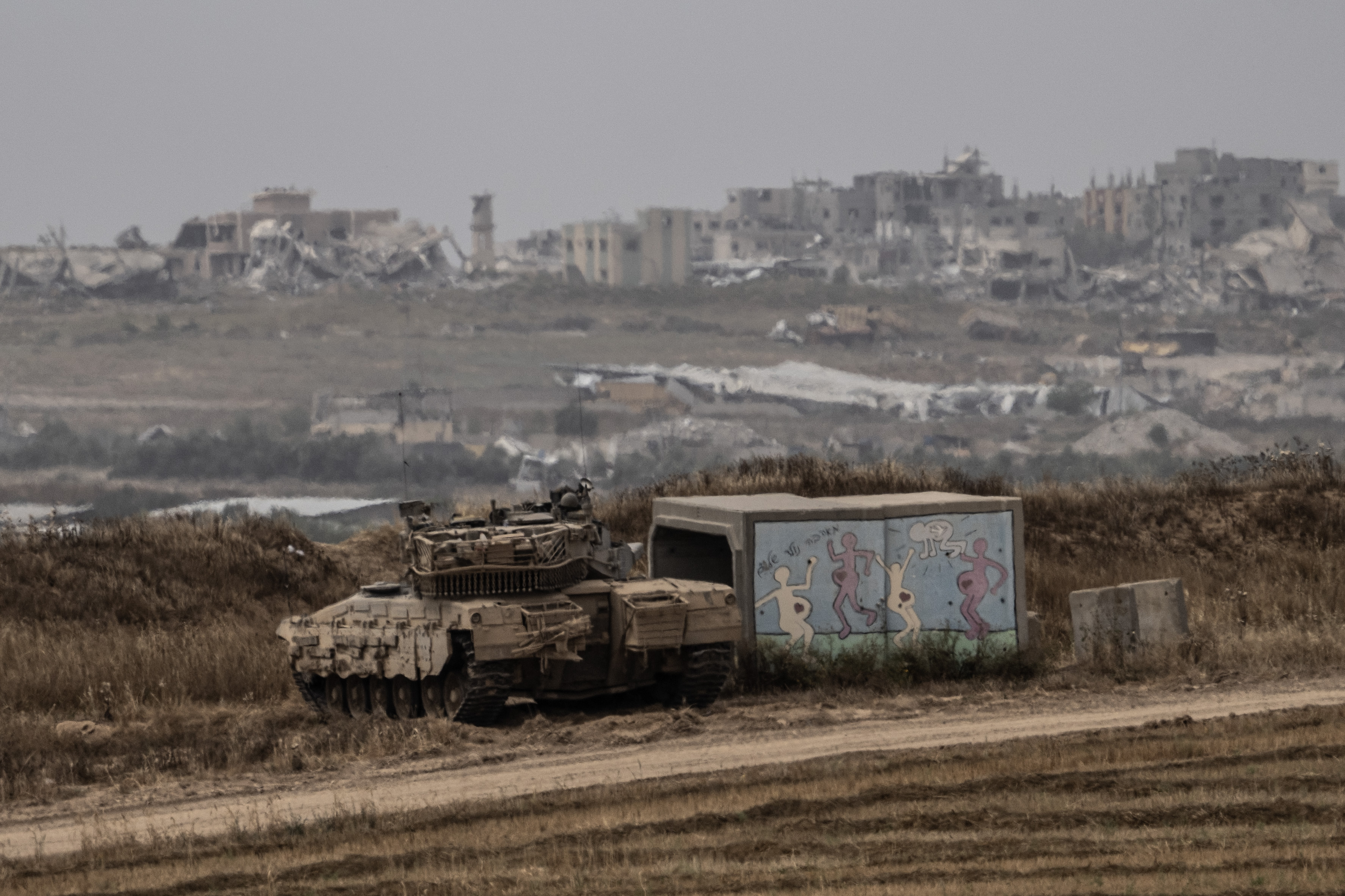
Israeli-Palestinian Affairs
Trump and Harris both have called for the war in Gaza to come to an end. Harris has focused more on a cease-fire and hostage-release deal that the Biden administration has sought to advance for the past few months, while Trump’s main message has focused on making sure Israel achieves “victory,” without offering much detail. Both candidates support efforts to advance normalization and regional integration deals like the proposed Israel-Saudi normalization accord.
Harris-Walz: Five Key Positions and Statements
1. Calling for a cease-fire and hostage-release deal. In line with the Biden administration, Harris and Walz have made a cease-fire and hostage-release deal the central focus of their message on the Israeli-Palestinian conflict.
-
In a White House statement on the anniversary of the “heinous” Oct. 7 attack, Vice President Harris expressed that this was the “deadliest day for the Jewish people since the Holocaust” and that Hamas’ actions were “pure evil,” “brutal,” and “sickening.” She went on to say that the “extraordinary arc of Jewish history is full of pogroms and prejudice, slaughter and separation,” while recommitting to her “unwavering” support of Israel’s security. Harris also shared that it is “far past time” for a cease-fire and hostage deal, and that she will “always fight” for Palestinians to “be able to realize” their rights.
-
During a virtual event hosted by Emgage Action on Oct. 3, titled “Million Muslim Votes: A Way Forward,” Walz shared that “This war must end, and it must end now.”
-
On the anniversary of Oct. 7, Walz posted on X that he joins Biden, Harris, and all Americans to “again condemn” Hamas’ attack and recommit to the security of both Israel and the American Jewish community. He added “it’s time for a hostage deal and ceasefire that ensures Israel is secure, all hostages are released, the suffering in Gaza ends, and the Palestinian people can realize their right to dignity, freedom, and self-determination.”
2. Expressing empathy for Palestinians and calling for humanitarian aid into Gaza. In contrast to Trump and Vance, both Harris and Walz have spotlighted the plight of the Palestinian people and called for increased aid.
-
On her official government X account, Harris tweeted on Oct. 13, “Israel must urgently do more to facilitate the flow of aid to those in need. Civilians must be protected and must have access to food, water, and medicine. International humanitarian law must be respected.” In official statements, Harris often repeats the sentiment that she will fight for Palestinians to “realize their right to dignity, security, freedom, and self-determination.”
-
Harris shared that she “made clear” her “serious concern” regarding the “dire humanitarian situation there, with over 2 million people facing high levels of food insecurity and half a million people facing catastrophic levels of acute food insecurity,” to Israeli Prime Minister Benjamin Netanyahu during their meeting last July.
-
Most recently, during a town hall event in Pennsylvania on Oct. 23, Harris described the death toll of innocent Palestinians as “unconscionable,” and prefaced that the death of Hamas leader Yahya Sinwar provides an opportunity to “end the war,” “bring relief to the Palestinian people” and “work toward a two-state solution, where Israel and the Palestinians – in equal measure – have security, where the Palestinian people have dignity, self determination and the safety they that they so rightly deserve.”
3. Highlighting close US-Israel cooperation in the fight against Hamas. Harris praised the elimination of Hamas leader Sinwar, and highlighted the close cooperation between the two countries that helped produce that moment.
-
During Harris’ remarks on the death of Sinwar on Oct. 17, she stated that the US, Israel, and the world are “better off as a result,” and commended American special operations and intelligence for “work[ing] closely” with Israel to “locate and track” Sinwar and Hamas leaders. Harris commented that Sinwar has “American blood on his hands” and was the “mastermind” behind the Oct. 7 terrorist attack, which sparked “a war that has led to unconscionable suffering of many innocent Palestinians and greater instability throughout the Middle East.”
-
Upon the death of Sinwar, Harris declared that “there is clear progress towards [the] goal” of eliminating the threat Hamas poses to Israel, declaring that “Hamas is decimated, and its leadership is eliminated.” She affirmed that Sinwar’s death “gives us an opportunity to finally end the war in Gaza” and that “it is time for the day after to begin without Hamas in power.”
4. Underscoring the strong bond between the people of the United States and Israel. Harris and Walz distanced themselves from the current Israeli prime minister by reaffirming America’s close relationship with the Israeli people.
-
In Harris’ “60 Minutes” interview, she answered a question about whether Israeli Prime Minister Netanyahu is a “close ally” by saying: the “better question” is “do we have an important alliance between the American people and the Israeli people, and the answer to that question is yes.”
5. Remaining aligned with the Biden administration’s approach to the Middle East. Not surprisingly, Harris and her running mate did not offer any major differences of views with the Biden administration on its Middle East approach.
-
On Oct. 15, Walz was asked what he would do differently from the current Biden administration to put an end to the violence in the Middle East, in an interview on 7 News Detroit. Walz responded with “it’s unacceptable” and noted that a different approach to the issue will come from the new “leadership style” that Harris has “shown she can bring forward.” He further stated that it is necessary that “we lead with our values, we do not abandon our allies, and we do not coddle dictators.”
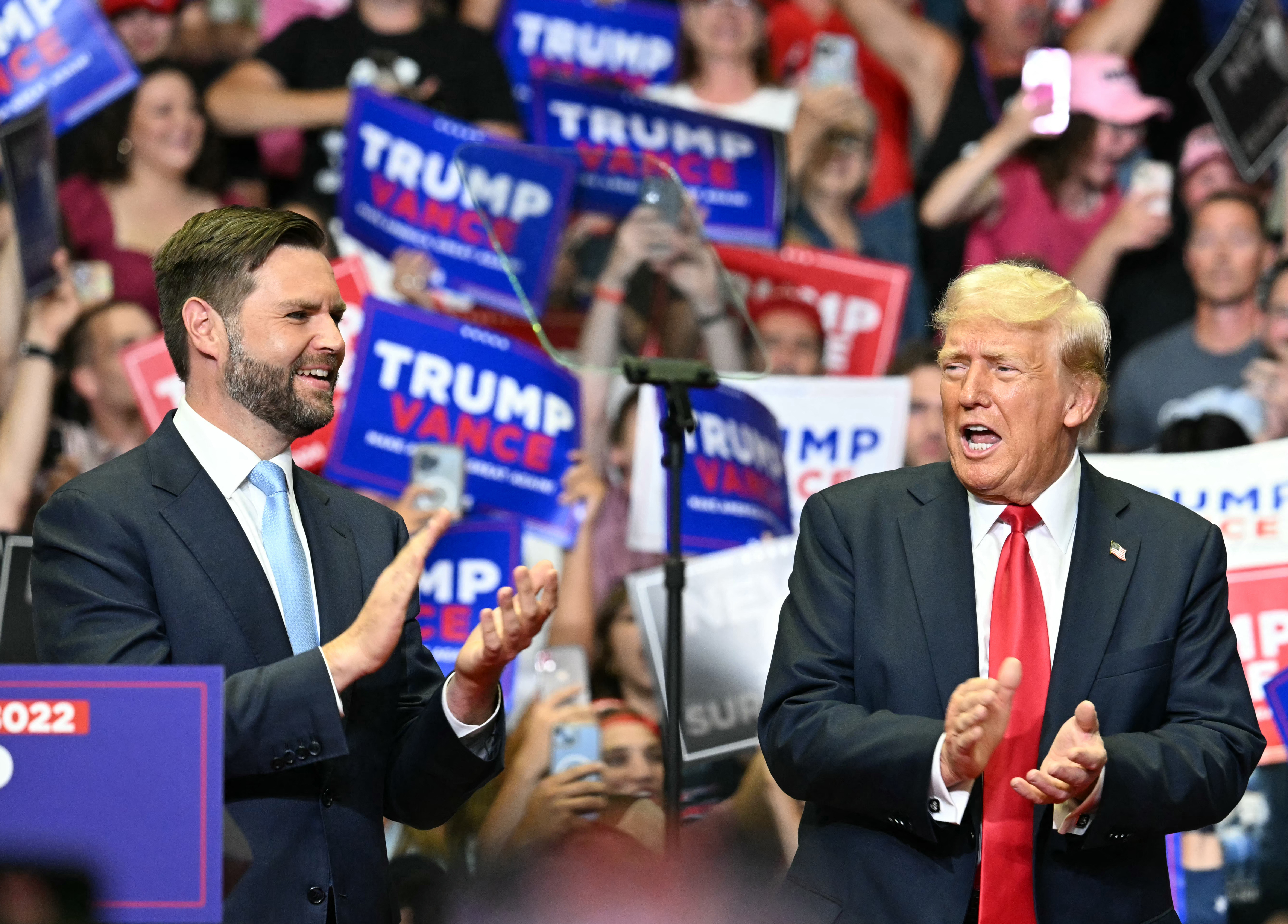
Trump/Vance: Five Key Positions and Statements
1. Voicing strong support for Israel. Trump regularly touted himself as the “best friend” of Israel.
-
During Trump’s speech to the Israeli-American Council in Washington on Sept. 19, he stated “we’re going to make Israel great again” and affirmed that with the Jewish American vote, he will be their “defender,” “protector,” and the “best friend Jewish Americans have ever had in the White House.” He mentioned that this US election is the “most important election in the history of Israel,” and that Israel is in “big trouble” and will be “wiped off the face of the earth” if he doesn’t win. At the same event, Trump also appeared to partly blame Jewish Americans were he to potentially lose the election, saying, “If I don't win this election — and the Jewish people would really have a lot to do with that if that happens because if 40%, I mean, 60% of the people are voting for the enemy — Israel, in my opinion, will cease to exist within two years.”
-
Trump stated that the Oct. 7 attack was “one of the darkest hours in all of human history,” explaining that it was “an attack on humanity itself” that revealed “chilling savagery” and “demonic delight.” He reaffirmed that the US-Israel bond is “strong and enduring,” but will be “stronger and closer than it ever was before” if he wins the election. Trump stated, “We must stop this perilous slide into conflict, hatred, and destruction” through “unwavering American leadership and unquestioned American strength,” which would allow for “the dawn of a new, more harmonious Middle East [to be] finally within our reach.” He further underscored that “if it’s not the United States, it’s not going to happen.”
2. Supporting Israel’s right of self-defense. Trump has talked about giving Israel everything it needs to defend itself and letting it “finish the job.”
-
In a phone call with Prime Minister Netanyahu earlier this month, Trump reportedly said Israel should “do what you have to do” in order to protect the country.
-
During an Oct. 7 remembrance event in Florida, Trump vowed that he will “support Israel’s right to win its war on terror,” adding that “it has to win it fast, no matter what happens, it has to go fast.”
-
This echoed Trump’s previous comments that Israel needs to wrap up the war against Hamas in Gaza. Speaking on the “Hugh Hewitt Show” earlier this year, Trump said, “You’ve got to get it over with, and you have to get back to normalcy. And I’m not sure that I’m loving the way they’re doing it, because you’ve got to have victory. You have to have a victory, and it’s taking a long time.”
-
Speaking at the “Stand with Israel” rally on Oct. 7, Vance said, “Because we want peace more than anything else and because we’d like to prevent this from becoming a broader regional conflict, we support Israel's right to exist, we support Israel’s right to defend itself, and to do what it takes to end the war.” He later added that, “We want to give Israel the right and the ability to finish what Hamas started. Israel didn't start this, Hamas did, but Israel is going to finish it.”
-
In a speech in Washington, DC, on Sept. 19, Trump pointed out that “on top of everything else, [he] gave [Israel] more than $20 billion dollars,” and that when he did it, he said he’s “the best friend they’ve ever had.”
3. Arguing that the Biden-Harris approach has prolonged the war. Both Trump and Vance regularly criticized the Biden-Harris approach to the Israel-Hamas war as weak and wavering.
-
In an interview on “Fox & Friends” on Oct. 7, Vance stated that on the anniversary we should remember that there is “true barbarism” and “true evil” in the world, and that “when the good guys are against the bad guys, America should try as much as we can to support the good guys.” Vance argued that the current administration’s “wavering” and “waffling” actions have “unnecessarily killed” both Palestinians and Israelis, and prevented lasting peace from being achieved in the region.
-
Vance called for “stronger and smarter” US leadership, arguing that Harris has “pursue[d] policies that prolong the war” while being at “the forefront of threatening to stab our allies in the back.” He pointed to the current administration’s decision to withhold precision guided weapons, stating that this would actually allow us to “destroy the Hamas bad guys” while “minimiz[ing] civilian casualties.”
-
Speaking at a press conference in mid-August, Trump criticized Harris and the Biden administration for repeatedly calling for a cease-fire. “From the start, Harris has worked to tie Israel’s hand behind its back, demanding an immediate cease-fire, always demanding cease-fire,” which, Trump asserted, “would only give Hamas time to regroup and launch a new October 7-style attack.”
4. Supporting the Israeli strike that eliminated the leader of Hamas. Trump and Vance both voiced support for Israel’s killing of Hamas leader Yahya Sinwar.
-
When Trump was asked about his reaction to the death of Sinwar and whether it makes peace easier or more difficult in the Middle East, he responded, “My reaction is he was not a good person,” and “I think it makes it easier.” Trump continued by saying that Israeli Prime Minister Netanyahu is “doing a good job,” that Biden is “trying to hold [Netanyahu] back and should probably be doing the opposite,” and that he is “glad that Bibi decided to do what he had to do,” while remarking that “it’s moving along pretty good.”
5. Touting his achievement in the Abraham Accords. Trump argues that the 2020 deal that normalized relations between Israel on the one hand and the United Arab Emirates, Bahrain, and Morocco on the other would be expanded soon.
-
In an interview with Al Arabiya on Oct. 20, Trump highlighted that he is “truly confident” that “real” and “lasting” peace will happen soon, while repeating that the Israel-Hamas war would not have started if he were president. He also stated that “getting everybody in” on the Abraham Accords will be a priority in his next term.
Conclusion: Possible Impact on the Elections and US Policy in the Longer Term
This assessment of Middle East policy positions staked out by the two leading presidential candidates in the final weeks of the 2024 campaign has focused on two key issues dominating the Middle East landscape: Israeli-Palestinian affairs and Iran. Whether these issues will matter in shaping the presidential election’s outcome remains to be seen. The leading concerns in this electoral cycle are closer to home. The Middle East still could impact the election in some big ways — a wider regional war increasing oil and gas prices, some event involving US troops or hostages that steals the spotlight, or a terrorist attack on the homeland or against Americans in the region — all of which could tip the balance in unpredictable ways in an election where the margins are so tight.
Furthermore, very vocal and organized constituencies inside of America that have a close connection to events in Israel, Palestine, Lebanon, and Iran might sway the vote in key swing states such as Michigan and Pennsylvania. The various voices — pro-Palestinian, pro-Israel — have an ability to impact the outcomes in America’s electoral college system in ways that are difficult to predict. America remains a deeply divided country along political and ideological lines, and its adversaries and competitors are actively working to stoke those divisions to induce further policy paralysis than has already been experienced in recent years.
With about a week to go until the election, it remains unclear who will win the presidency and which party will get the majority of seats in the US Senate and House — but one outcome that seems quite likely is that America’s federal government will remain sharply split along partisan lines because the voting margins are so slim.
What does this mean for US policy in the Middle East in the longer term? Two scenarios could unfold — one that is stuck in the past, and a second that is more forward-looking. The first scenario, which seems more likely, is that Republicans and Democrats will continue to use a wide range of public policy issues, including Middle East foreign policy, as a partisan and ideological wedge. This has been the model the United States has operated with over the past quarter-century, and these divisions in many ways hamper America’s ability to get things done: to get diplomats and military leaders in place, to pass budgets needed to execute programs, and to advance a more cohesive national security strategy in the Middle East.
A second scenario, which seems less likely right now, is one in which leaders in both parties recognize that America’s adversaries, including Iran, have sought to stoke partisan and ideological differences inside the United States to prevent Washington from pursuing steadier and more consistent engagement in the Middle East. One can certainly point to recent instances in Congress and the Biden and Trump administrations of when Democratic and Republican lawmakers and officials crossed the aisle and worked together on key aspects of US foreign policy on China and Russia. The two parties’ leaders should draw lessons from those successful examples of bipartisanship and take similar steps to build coalitions across the political spectrum that seek to advance a more effective, longer-term US approach toward the Middle East.
Brian Katulis is Senior Fellow for US Foreign Policy and Senior Advisor to the President of the Middle East Institute.
Athena Masthoff is Policy and Program Associate at the Middle East Institute.
The Middle East Institute (MEI) is an independent, non-partisan, non-for-profit, educational organization. It does not engage in advocacy and its scholars’ opinions are their own. MEI welcomes financial donations, but retains sole editorial control over its work and its publications reflect only the authors’ views. For a listing of MEI donors, please click here.













